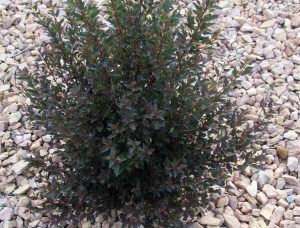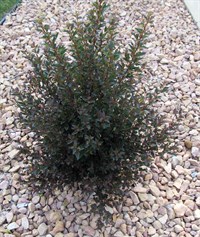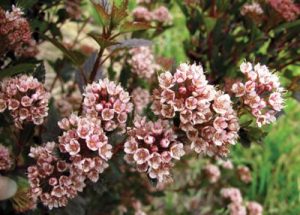American Nurseryman Magazine Staff — May 1, 2013

Click image to enlarge.
Photos courtesy of Dr. David C. Zlesak
Dark-foliaged shrubs make excellent focal points and provide wonderful contrast and backdrops for other plants in the landscape. In recent years the palette of shrubs that can serve this valuable niche has greatly expanded. The once key staples of purple-leaved sand cherry and barberry are now joined by many dark-foliaged cultivars of weigela, elderberry and especially ninebark. The diversity of plant habit, size and texture along with the added benefit of an attractive floral display found in many of these dark-foliaged plants offer today’s landscape professionals and homeowners more options than ever.
My favorite premier shrub transitioning to the dark side is ninebark (Physocarpus opulifolius). Native to the eastern half of the United States and into Canada, this species offers environmental adaptability, durability and value. Diabolo® is the first dark-leaved ninebark cultivar; it came onto the U.S. market almost 15 years ago. It is a tall grower and took the market by storm as an alternative to purple-leaved sand cherry. Diabolo® spurred on a flurry of ninebark breeding to generate the many newer, dark-foliaged cultivars we have today. Most are slightly smaller than Diabolo® and include cultivars that possess similar foliage color, like Summer Wine®, as well as those that combine both gold and purple foliage, like ‘Center Glow’, Coppertina™ and Amber Jubilee™.
Name: Physocarpus opulifolius (‘Donna May’;USPP 22,634)
Trade name: Little DevilT ninebark
Hardiness: Zones 3 to 7
Mature height: Up to 4 feet
Mature spread: Up to 4 feet
Classification: Deciduous shrub
Landscape use: Colorful, dark-foliaged shrub:specimen, grouping, or hedge; outstanding focal point or backdrop for other landscape plants;containers
Ornamental characteristics: Dark, finetexturedfoliage is resistant to powdery mildew; compact plant habit with a strong branching tendency; attractive display of blush-pink flowers in spring.
Little Devil™ (‘Donna May’; USPP 22,634) is a recent and exceedingly compact and versatile new dark-foliaged ninebark. It started as a daydream in 2001 when I was looking at plants of Diabolo® and ‘Nanus’ and envisioned a hybrid combining the compact, well-branched habit of ‘Nanus’ with the dramatic foliage color of Diabolo®. My initial hybrids were intermediate in size. As they were maturing, Summer Wine® (which is from the same cross) came on the market. Recognizing these first generation plants were not as compact as ‘Nanus’, I pushed ahead. Backcrossing my selections to ‘Nanus’ led to a diverse population containing several compact seedlings that varied in degree of foliage color, plant habit and powdery mildew resistance. Little Devil™ stood out from the rest, possessing all the key attributes I was aiming for: very dark foliage, a compact and well-branched plant habit, and powdery mildew resistance.
Little Devil™ has all the great soil and climate adaptability ninebark is known for. Plant it in part to full sun under typical landscape conditions and watch it take off. Little Devil™ and its parent ‘Nanus’ share the valuable and unusual feature of reduced apical dominance, leading to strong branching potential on current season’s growth without pruning. Inherent branching leads to a naturally dense and more self-supporting plant habit relative to taller, more open growing ninebark cultivars.
Strong branching in Little Devil™ also leads to a prolific display of blush-pink flowers showcased against the dark foliage over a few week period in spring. Little Devil™ has a tendency to produce a small quantity of flowers off and on throughout the rest of the growing season.

Click image to enlarge.
The fine-textured appearance of Little Devil™ especially sets it apart from other ninebark. The small and tightly spaced leaves are even slightly smaller and closer than ‘Nanus’. Plants reach 3 to 4 feet in height and width and can serve a wide range of informal and formal landscape uses. Dense branching and small leaves make it suitable for shearing. Little Devil™ is a valuable and welcomed new dark-foliaged shrub alternative to barberry in areas where barberry is no longer being recommended due to its invasive potential.
Little Devil™ is being marketed by Bailey Nurseries in its First Editions® program and is available from a wide group of First Editions® growers. Little Devil™ roots readily from softwood and semi-hardwood cuttings (propagation is prohibited without a license).
Officially debuted in 2011, the reputation and availability of this new award winning ninebark is growing. Little Devil™ won the 2011 ANLA Garden Idol award and three European awards for being an innovative and valuable new plant. Daydreams do come true!
Dr. David C. Zlesak
Assistant Professor of Horticulture University of Wisconsin-River Falls
[email protected]